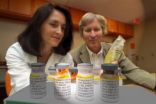New study: Serious gaps in medical journals' disclosure of physician relationships with industry
Readers aren't informed about conflicts of interest that could affect patient care, even when sums involved are over $1 million
2010-09-13
(Press-News.org) (New York, NY) Nearly half the surgeons who made at least $1 million in payments from orthopedic device companies did not have that relationship published in their scientific articles, according to a study released today in the on-line edition of the Archives of Internal Medicine. The study shows that readers are not being adequately informed about conflicts of interest even when the funds involved are significant.
The study, conducted by researchers at the New York-based Institute on Medicine as a Profession (IMAP), is the first of its kind to use company records to check on the accuracy of disclosure information listed in medical journals. The five manufacturing firms studied disclosed the dollars they paid to consultants in a public database. IMAP researchers searched the database and compared the list to the financial disclosure information, if any, listed in the journal articles.
"The findings raise troubling questions about undisclosed payments or royalties and other fees from medical device companies that could lead to biased scientific conclusions," says senior author David Rothman, president of IMAP (www.imapny.org), a think tank based at the Columbia University College of Physicians & Surgeons in New York City. He co-authored the study with IMAP colleagues Susan Chimonas, associate research scholar and Zachary Frosh, research associate.
The authors note that journal editors typically don't check multiple databases that are now available and simply rely on the honor system. They expect a researcher to disclose all conflicts but do not verify if the information is complete and accurate.
Rothman and colleagues argue that full disclosure in medical journal articles is vital. "These articles constitute a permanent scientific record that is used by practicing physicians, guideline committees, purchasers and patients to evaluate treatment options. Journal editors, reviewers and readers must be fully informed about authors' industry relationship to consider the potential for bias," they write.
IMAP compared 2007 physician payment information from five orthopedic device companies with disclosure of company payments in journal articles. These five companies (Biomet, DePuy Orthopedics, Smith & Nephew, Stryker, and Zimmer) made a total of 1,654 payments that amounted to $248 million in 2007 for consulting, honoraria or other payments for services. The analysis also showed that payments to 41 orthopedic surgeon researchers ranged from just over $1 million to a high of $8.8 million, representing 62 percent of all company expenditures.
These highly paid orthopedic consultants became the focus of the analysis because of the size of their payments. The IMAP team homed in on 95 articles published in the scientific literature after researchers received their large payments and found that fewer than half of the journal articles disclosed a financial relationship between the author and company.
In no case did journal articles reveal how substantial the payments were to the authors. Almost all of articles were directly related to a device, like a hip implant, made by the company. This study focused on orthopedic surgeons but other studies suggest other medical specialists also fail to have their industry ties published.
Rothman says consumers should be concerned. "Patients have a real stake in transparency. You want to make sure that the surgeon is choosing the device that is best for you and that your doctor is not getting biased information."
Growing data show patients are increasingly wary of physician industry ties. A recent study by Consumer Reports showed that half of patients thought that gifts from drug companies influenced their doctor's choice of drugs.
Rothman says editors and others need to start using the company's data bases to get information about physician-industry relationships. No less than 15 drug and device companies are now putting payment information on their websites, says Rothman, a practice that will be accelerated by the Patient Protection and Affordable Care Act. Under the new health reform law, all drug and device manufacturers will have to report payments to physicians in a searchable public database by 2013. Editors, consumers, deans of medical schools and others will then be able to search for any doctor's name and a list of payments from drug or medical device manufacturers.
Having a sunshine policy enshrined in law will make a big difference in promoting transparency, says Rothman. "The next generation of physicians should know that every nickel they take from industry is going to be made public."
###
A copy of the article "From Disclosure to Transparency, The Use of Company Payment Data" in the September 13 issue of the Archives of Internal Medicine can be obtained by calling 312-464-5262 or by e-mail at mediarelations@jama-archives.org.
The Institute on Medicine as a Profession seeks to shape a world inside and outside of medicine that is responsive to the ideals of medical professionalism. IMAP supports research on the past, present, and future roles of medical professionalism in guiding individual and collective behavior. It aims to make professionalism in medicine relevant to physicians, leaders of medical organizations, policy analysts, public officials, and consumers. For more information, visit www.imapny.org
ELSE PRESS RELEASES FROM THIS DATE:
2010-09-13
New York (September 13, 2010) - According to a new study a protein crucial for the immune response appears to be a key player in the progression of a devastating form of childhood leukemia called T-cell acute lymphoblastic leukemia (T-ALL). Suppressing the activity of the protein kills the leukemic cells, the study shows, opening a potential avenue to new drugs that could prevent progression of the disease.
Led by Iannis Aifantis, PhD, associate professor of pathology and director of the Cancer Stem Cell Program at the NYU Cancer Institute at NYU Langone Medical Center, ...
2010-09-13
DALLAS – Sept. 13, 2010 – A tiny molecule that spurs the progression of non-small-cell lung cancer could become a player in fighting the disease, say researchers at UT Southwestern Medical Center, who published a study on how the molecule behaves in mice in the Sept. 14 issue of Cancer Cell.
Scientists have known that the molecule microRNA-21, or miR-21, is present in overabundant quantities in human tumors, including non-small-cell lung cancer (NSCLC). Until now, however, it was unclear whether miR-21 contributed to the development of lung cancer, or whether it was simply ...
2010-09-13
DAVIS--A research team from the University of California, Davis and Peking University, China, has discovered a novel mechanism as to why the long-term, high-dosage use of the well-known arthritis pain medication, Vioxx, led to heart attacks and strokes. Their groundbreaking research may pave the way for a safer drug for millions of arthritis patients who suffer acute and chronic pain.
Using metabolomic profiling to analyze murine (rodent) plasma, the scientists discovered that Vioxx causes a dramatic increase in a regulatory lipid that could be a major contributor to ...
2010-09-13
A study led by researchers at the BC Centre for Excellence in HIV/AIDS (BC-CfE) at St. Paul's Hospital and the University of British Columbia has found that supervised injection facilities such as Vancouver's Insite connect clients with addiction treatment, which in turn resulted in greater likelihood of stopping injection drug use for at least six months.
The study, recently published in the peer-reviewed journal Drug and Alcohol Dependence, is the first ever to examine the link between a supervised injection facility and injection cessation.
"Extensive research has ...
2010-09-13
Researchers funded by the Biotechnology and Biological Sciences Research Council
(BBSRC) have discovered key plant enzymes that normally make the energy stored in wood, straw, and other non-edible parts of plants difficult to extract. The findings, published today in Proceedings of the National Academy of Sciences, can be used to improve the viability of sustainable biofuels that do not adversely affect the food chain.
The team based at the University of Cambridge, and now part of the BBSRC Sustainable Bioenergy Centre (BSBEC), has identified and studied the genes for ...
2010-09-13
An antibiotic appears to be a safe treatment for stroke and a good companion therapy for tPA, the clot buster that is currently the only FDA-approved drug therapy, researchers report.
A safety study in 60 stroke patients in Georgia, Kentucky and Oregon found the drug well tolerated even at three-and-one-half times the dose currently used for conditions such as rheumatoid arthritis, according to a research team led by the Medical College of Georgia and the University of Georgia.
"It's cheap, safe, well tolerated, easy to administer and can be given with tPA," said Dr. ...
2010-09-13
The theory holds that one of the best ways to attract foreign capital consists in the adoption of a reduced level of taxes in certain cases, and above all, in the provision of legal certainty. This aim of attracting foreign investment inspired the measures for the the Entidades Tenedoras de Valores Extranjeros (ETVE) or Spanish holding companies, adopted in Spain in the late 1990's and which led to the establishment of these companies in Spain by multinational companies. However, things are changing, according the head of the UC3M Research Group of Taxation and Finance ...
2010-09-13
Mom's advice about cleaning your hands may finally be starting to get through.
In the latest observational study sponsored by the American Society for Microbiology and the American Cleaning Institute® (formerly The Soap and Detergent Association), 85% of adults washed their hands in public restrooms, compared with 77% in 2007. The 85% total was actually the highest observed since these studies began in 1996. The results were announced at the Interscience Conference on Antimicrobial Agents and Chemotherapy, an infectious disease meeting sponsored by the American Society ...
2010-09-13
Albany, NY—September 13, 2010— New research on the children of LGBTQ people (lesbian, gay, bisexual, transgender and queer) has unequivocally revealed that they are not only psychologically healthy, but often appear to exhibit better social and academic adjustment and a significantly lower incidence of social problems than their peers. A new article published in the journal Family Process critically examines this research, and how it impacts LGBTQ families.
According to Family Therapist and Social Work professor, Arlene Istar Lev these excellent outcomes might be masking ...
2010-09-13
RUSTON, La – Dr. Bogdan Strimbu, assistant professor of biometrics and quantitative silviculture at Louisiana Tech University's School of Forestry, recently organized and conducted a technical session at the International Union of Forest Research Organization's (IUFRO) XXIII World Congress in Seoul, South Korea.
The Congress, held every five years, brings together industry leaders from the IUFRO's eight divisions to help form the future research direction for the global field of forestry. The group also decides the organization's general course of research and associated ...
LAST 30 PRESS RELEASES:
[Press-News.org] New study: Serious gaps in medical journals' disclosure of physician relationships with industry
Readers aren't informed about conflicts of interest that could affect patient care, even when sums involved are over $1 million

